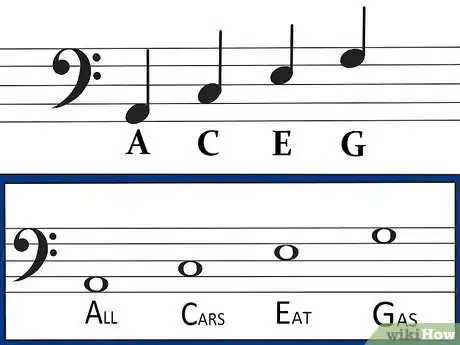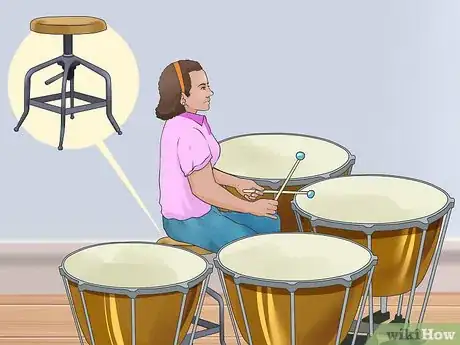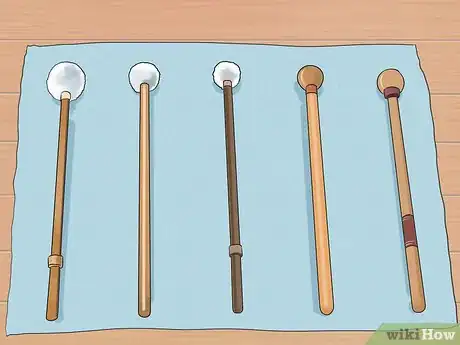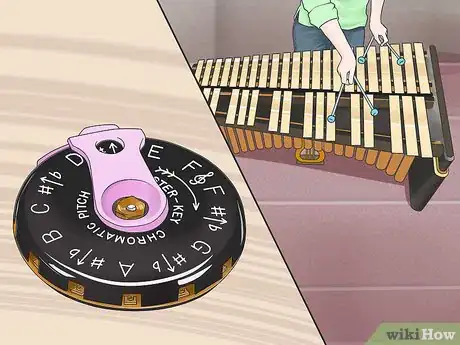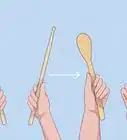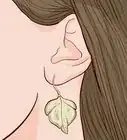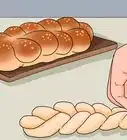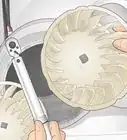X
wikiHow is a “wiki,” similar to Wikipedia, which means that many of our articles are co-written by multiple authors. To create this article, 18 people, some anonymous, worked to edit and improve it over time.
This article has been viewed 34,083 times.
Learn more...
The timpani, also known as kettle drums, are a type of percussion instrument commonly used in the orchestra or marching band. Here, you can learn how to play a timpani with the steps below!
Steps
-
1First, you will have to know how to read bass clef music. The spaces on the staff, going from bottom to top are: A, C, E, G (acronym- All Cars Eat Gas). The lines going from bottom to top are: G, B, D, F, A (Glad Bags Don't Fall Apart).[1]
-
2Sit on a spinning stool in front of however many timpani you need to play. They should be arranged in a semi circle around you so that they are easy to reach. Make sure the timpani are almost (but not) touching and that you don't need to pull your elbow out or in to reach any of the drums.Advertisement
-
3Make sure you have timpani mallets. There are different ones for the different sound you want to get out of the timpani. Some people use a French grip which is like matched grip for snare, except the wrists are turned so that the thumbs are pointed upward. You can also grip the mallets like you would with matched grip. Either is correct.[2]
-
4To tune a timpani, you will need a pitch pipe, or if there is a vibraphone nearby, it will work just as well because its keys will not go out of tune. Before you begin tuning, move the pedal as far down as it will go so the timpani plays the lowest possible note. Gradually increase the pitch by pushing the pedal forwards. If you go past the desired pitch, start back at the lowest note again. Make sure that, when checking the music to see what notes you will be playing, the higher note will go on the smaller drum and the lower note will go on the bigger drum. The drums should also be arranged largest to smallest because this makes the music much more easier to read.[3]
-
5Read the music just as you would any other music, making sure that you are playing the right drums at the right time, depending on where they are located in front of you and where the notes are located on the staff.
Advertisement
Community Q&A
-
QuestionHow do you know when you have tuned the drums properly?
 Community AnswerSee if the note being played on the timpani sounds like it is the same pitch as the one on the vibes/pitch pipe.
Community AnswerSee if the note being played on the timpani sounds like it is the same pitch as the one on the vibes/pitch pipe. -
QuestionHow do I tune a timpani?
 Andrew YungCommunity AnswerThere should be a pedal on the bottom that you can adjust with your foot to change the pitch of the drum.
Andrew YungCommunity AnswerThere should be a pedal on the bottom that you can adjust with your foot to change the pitch of the drum. -
QuestionHow do I know which drum should be on the right?
 Community AnswerThe smallest drum should be on the right, and drum size should increase as you move to the left. Timpani are characterized by a large bowl underside and a booming sound when played.
Community AnswerThe smallest drum should be on the right, and drum size should increase as you move to the left. Timpani are characterized by a large bowl underside and a booming sound when played.
Advertisement
Warnings
- Tune the timpani to the lowest note when you have finished with it, or else the heads will wear out.⧼thumbs_response⧽
- Never carry or drag a timpani by the rim! This will damage the drum. Always hold onto the lugs (bars on the side) when moving it.⧼thumbs_response⧽
- Don't place things on top of the timpani at any time, as it can make the drums go out of tune.⧼thumbs_response⧽
Advertisement
Things You'll Need
- Timpani
- Timpani mallets
- Timpani music
- Pitch pipe for tuning (vibraphone works just as well)
References
About This Article
Advertisement
